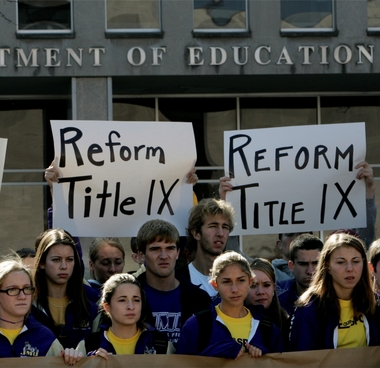LGBT students at Title IX exempt schools face tough choices

by Rob Howard
Associate Editor
Title IX of the Education Act protects students at college and universities from discrimination based on their sexual orientation or gender identity. At least, most of the time. There are 234 religiously affiliated schools that have received religious exemptions from Title IX by the Department of Education.
According to the DOE Office of Civil Rights, “Under the Title IX statute and its implementing regulation at 34 C.F.R. § 106.12, Title IX does not apply to an educational institution that is controlled by a religious organization to the extent that application of Title IX would be inconsistent with the religious tenets of the organization.”
That poses a difficult choice for LGBT students at those schools. Religion News Service (RNs) ran an article by Tristan Campbell, who was formerly a student at Oklahoma Baptist University. Campbell, who identifies as bisexual, was assaulted by a male student he was dating.
According to Campbell, “When a man I was dating last fall physically assaulted me, I felt the full impact of how vulnerable my school’s Title IX waiver made me. The circumstances surrounding what happened aren’t as important as the situation it put me in.
“Because it was an assault by an intimate partner on campus, accurately and truthfully reporting what happened would have meant outing both of us. This meant we could lose our jobs, be kicked out of university housing and potentially be expelled.”
This is not some abstract danger, says Campbell[RH1] . “My school’s administrators coined the term ‘right to discriminate’ in reference to the firing of a bisexual student worker. This is an immediate threat that is costing students their jobs, housing and education. The campus community of OBU no longer feels safe because that community is segregated between those who are protected under the law, and those who are not.”
Campbell was in a class with the attacker. In a school that is covered by Title IX protections, the attacker would, at least, be reassigned to a different class than the victim. But as Campbell notes, reporting the attack might subject him, and the attacker, to expulsion.
Campbell is now a student at the University of Oklahoma.
In The Gayly’s area – Arkansas, Kansas, Missouri, Oklahoma and Texas – there are 41 schools that have been granted religious exemptions from protection of students against discrimination based on their sexual orientation or gender identity.
Notable schools in Arkansas include Harding University, Ouachita Baptist University, and Southern Baptist College. In Kansas, Tabor College is exempt; in Missouri, Assemblies of God Theological Seminary, Concordia Seminary, Southwest University, and 10 others. In Oklahoma, Oklahoma Baptist University, Southern Nazarene University, Oral Roberts University and six other schools are exempt. Texas exempt schools include Baylor University and 12 others.
Universities affiliated with the Southern Baptist Convention seem to be generally exempt according to the DOE/OCR list. Students planning on attending a religiously affiliated school should clearly understand that school’s policy on sexual orientation and gender identity, and consider how that policy might affect them.
The DOE/OCR’s complete list of exempt colleges and universities, and those that have applied for religious exemption, can be found here.
The Gayly – July 18, 2016 @ 1:30 p.m.





